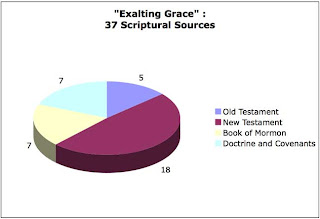| Well, "Exalting Grace" bears my name, 'cause I wrote it down. In a deeper sense, though, I have to confess that it's not my child. It isn't very original, and I wouldn't dare claim otherwise. I put borrowed words to a borrowed tune, distorting each as little and as lovingly as possible. Much closer to the self-effacing Shaker model than to contemporary self-promoting authorship, although in 1978 I hadn't yet encountered the Shakers, and I'm not particularly averse to recognition. |
 | The sheet music lists 37 Scriptural passages from which I've borrowed, explicitly and gratefully. Each reports an utterance of the God3 I worship. |
| Most come from the Bible (5 Old Testament, 18 New, King James Version), with 7 from the Book of Mormon and another 7 from the Doctrine and Covenants. Doctrinally, there's little4 here that should bother any committed follower of Jesus Christ. It has already a significant and (thus far) durable place in my private devotions. Ultimately, that's enough. But if others can find it congenial to their own spiritual life, that's an extra blessing. Some of you have been kind enough to say so. Apart from authorship and credits and such, the other question that keeps popping up has to do with my Church's “Green Book”:5 By sharing “my hymn” in this modern manner, am I angling to obtain for it the kind of approved-for-worship imprimatur that the 341 pieces in that volume enjoy? Complicated question. I'd be pleased and (yes, however inappropriately) flattered beyond measure if anything of the sort were to happen. I'd also be surprised, inasmuch as “Exalting Grace” deviates from the Green-Book pattern6 in some possibly-salient ways:
Turns out that last point takes this piece farther out of the Green-Book main stream than you might think. Even though the Scriptures are full of wonderful quotes attributed to the Lord: |
 |
If anybody were to wish to push this thing any further than the obscurity of a blog, there'd be more work to be done on it. |
1Not many, to be sure, but some distinguished ones. Colonel Loammi Baldwin of Woburn, Massachusetts, for example, ranks among the honored heroes of our Revolution.
2Hosea 1:8-9.
3Father, Son, or Holy Ghost.
4Verse 7 does state one central bit of Mormon doctrine that some might find controversial. If you don't like the source or the substance of a verse, please feel free to skip it. The rest will stand alone, and Heaven knows the angel gave us enough verses.
5Hymns of The Church of Jesus Christ of Latter-day Saints. Salt Lake City, Utah: The Church of Jesus Christ of Latter-day Saints, 1985.
6Some would call it a “standard.” On my stronger days, I'd be tempted to argue with them.


No comments:
Post a Comment